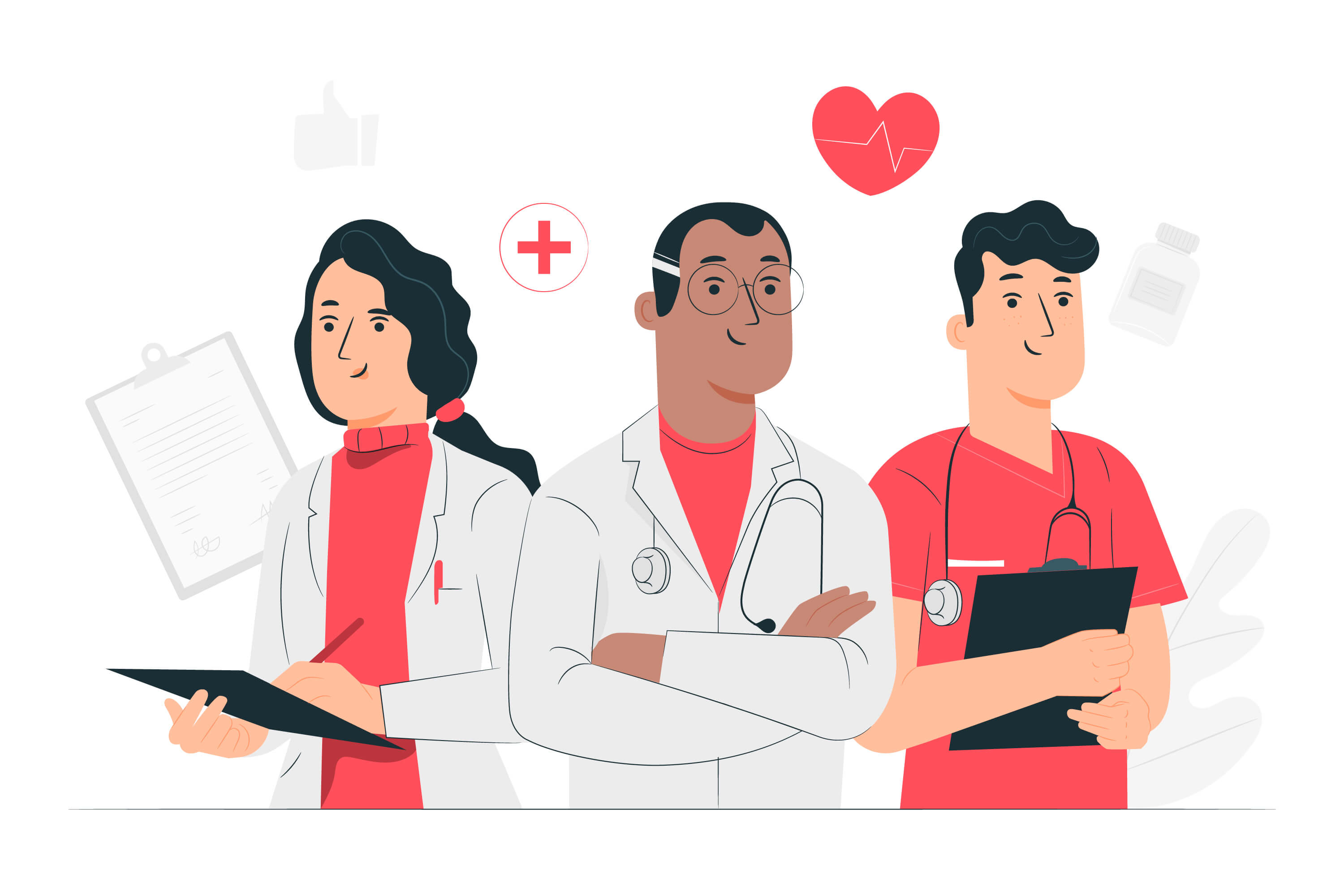DOCTOR INFORMATION
NHS ORGANISATION, FUNDING AND SERVICES
It is both important and useful to understand the basic structure funding and services provided by the NHS, whether you are a prospective medical student, a qualified doctor, or just curious.
Important Statistics:
 The NHS interacts with over 1 million patients every 36 hours ⌛
The NHS interacts with over 1 million patients every 36 hours ⌛
 The workforce consists of over 1.5 million people (approximately 200,000 of which are
The workforce consists of over 1.5 million people (approximately 200,000 of which are
Doctors)
 1st April 2013: Health and Social Care Act (2012) came into force which changed the structure of the NHS 📅
1st April 2013: Health and Social Care Act (2012) came into force which changed the structure of the NHS 📅

The Structure of the NHS:
The Department for Health:
 Government department in charge of UK healthcare policies and funding 📁
Government department in charge of UK healthcare policies and funding 📁
Sustainability and Transformation Partnerships (STPs):
 Unite local authorities, NHS providers, commissioners etc.
Unite local authorities, NHS providers, commissioners etc.
 To plan services based on long term needs of local populations (1 to 3 million people) 👫
To plan services based on long term needs of local populations (1 to 3 million people) 👫
Clinical Commissioning Groups (CCGs):
 As of 2020, there were 135 CCGs
As of 2020, there were 135 CCGs
 A group of hospitals/services that cover a geographical UK locations 🏨
A group of hospitals/services that cover a geographical UK locations 🏨
 Decide the services/treatments available in their hospitals and secondary care provision 🏨
Decide the services/treatments available in their hospitals and secondary care provision 🏨
NHS England:
 Independent body that oversees healthcare and ensures an effective system of CCGs 🔎
Independent body that oversees healthcare and ensures an effective system of CCGs 🔎
 Also supports commissioning
Also supports commissioning
NHS Foundation Trusts:
 Primary care services, hospitals, ambulance services, mental health services and social care services 🏨
Primary care services, hospitals, ambulance services, mental health services and social care services 🏨
 Provide the care commissioned by CCGs
Provide the care commissioned by CCGs
Primary Care:
 Delivered by General Practitioners
Delivered by General Practitioners
 Almost all GP Practices in England are part of 1300 Primary Care Networks (cover 30,000 to 50,000 people) 👫
Almost all GP Practices in England are part of 1300 Primary Care Networks (cover 30,000 to 50,000 people) 👫
Secondary Care:
 Specialists and healthcare professionals
Specialists and healthcare professionals
 Provide secondary care to patients referred by a GP
Provide secondary care to patients referred by a GP
 E.g. A & E, outpatient clinics, mental health and maternity health etc. 🏨
E.g. A & E, outpatient clinics, mental health and maternity health etc. 🏨
Tertiary Care:
 Specialised doctors/ nurses in specialised hospitals 🏨
Specialised doctors/ nurses in specialised hospitals 🏨
 Provide tertiary care to patients referred from secondary care
Provide tertiary care to patients referred from secondary care
 E.g. plastic surgery
E.g. plastic surgery
National Institute for Health and Care Excellence (NICE):
 Evaluates evidence for current and prospective treatments 📉
Evaluates evidence for current and prospective treatments 📉
 CCGs have to provide funding for treatments recommended by NICE 💷
CCGs have to provide funding for treatments recommended by NICE 💷
The Care Quality Commission:
 Independent monitoring agency that inspects safety/quality of hospitals/ GPs/ other healthcare organisations 🔎
Independent monitoring agency that inspects safety/quality of hospitals/ GPs/ other healthcare organisations 🔎
 Oversees the lifelong training and education of the NHS workforce
Oversees the lifelong training and education of the NHS workforce
Quick Summary
- The NHS funding and policies are determined by the Department for Health
- STPs are in charge of long term healthcare planning
- CCGs are in charge of distributing local healthcare funding
- CCGs must provide funding for treatments recommended by NICE
- The Care Quality Commission assesses the safety and quality of healthcare services

NHS Funding:
 The NHS funding comes directly from UK taxation 💷
The NHS funding comes directly from UK taxation 💷
 98.8% of funding comes from tax and national insurance
98.8% of funding comes from tax and national insurance
 1.2% of funding comes from patient charges
1.2% of funding comes from patient charges
 The current budget is £129.9 bn for 2020/21 💷
The current budget is £129.9 bn for 2020/21 💷
 CCGs in the UK are in control of distributing the available funding to hospitals and community care 🏨
CCGs in the UK are in control of distributing the available funding to hospitals and community care 🏨
Quick Summary
- The NHS is 98.8% funded by UK taxation
- The remaining 1.2% of funding is obtained from patient charges

NHS Services:
The NHS provides numerous healthcare services. It is important to understand the structure and pathways through which patients in the UK access NHS healthcare services.
Emergency Healthcare
999 Emergency:
 The UK telephone number for seriously ill patients who require immediate medical attention 📞
The UK telephone number for seriously ill patients who require immediate medical attention 📞
 For life-threatening illness/injury 💀
For life-threatening illness/injury 💀
Emergency Department:
 A service where doctors and nurses treat life threatening illness/injury primarily 💀
A service where doctors and nurses treat life threatening illness/injury primarily 💀
 Patients arrive via ambulance or voluntarily 🚑
Patients arrive via ambulance or voluntarily 🚑
 Patients are registered, then triaged and given a priority rating by a doctor/nurse to establish which patients need to be seen to most urgently ❗
Patients are registered, then triaged and given a priority rating by a doctor/nurse to establish which patients need to be seen to most urgently ❗
 Current target wait time is 4 hours ⌛
Current target wait time is 4 hours ⌛
111 NHS Service:
 The UK telephone number for patients who are not seriously ill but wish to seek medical advice or guidance about which healthcare service they should attend 📞
The UK telephone number for patients who are not seriously ill but wish to seek medical advice or guidance about which healthcare service they should attend 📞
 For non-life-threatening illness/injury 🤢
For non-life-threatening illness/injury 🤢
NHS Walk-in Centre:
 A service where doctors and nurses treat non-life threatening illness/injury primarily 🤢
A service where doctors and nurses treat non-life threatening illness/injury primarily 🤢
 Genitourinary Medicine services and chronic disease and infection management are also located within the walk-in centre 🏥
Genitourinary Medicine services and chronic disease and infection management are also located within the walk-in centre 🏥

Primary care Services
General Practice:
 GPs are often the first point of contact for people with a physical or mental health problem, either in a GP surgery or in a patient’s home 🏥
GPs are often the first point of contact for people with a physical or mental health problem, either in a GP surgery or in a patient’s home 🏥
 Everyday in the UK, there are over 1.3 million GP consultations
Everyday in the UK, there are over 1.3 million GP consultations
 GPs treat a broad range of common medical conditions
GPs treat a broad range of common medical conditions
 They also offer counselling, advice and education for patients
They also offer counselling, advice and education for patients
 GPs can conduct tests themselves, order imaging investigations, or refer patients who cannot be treated in the community to hospital services where they receive specialist treatment 🏥
GPs can conduct tests themselves, order imaging investigations, or refer patients who cannot be treated in the community to hospital services where they receive specialist treatment 🏥
 GPs work in a multidisciplinary team, alongside nurses, healthcare assistants, receptionists, midwives etc. 👫
GPs work in a multidisciplinary team, alongside nurses, healthcare assistants, receptionists, midwives etc. 👫
NHS Dental Services:
 Most dental practice in the UK is private, hwoever, some patients are entitled to free dental care on the NHS 💷
Most dental practice in the UK is private, hwoever, some patients are entitled to free dental care on the NHS 💷
 Patients can attend the Emergency Department for dental emergencies and pay a standard rate (£23.80 as of January 2021) which can then be claimed back by those entitled to free dental care 💷
Patients can attend the Emergency Department for dental emergencies and pay a standard rate (£23.80 as of January 2021) which can then be claimed back by those entitled to free dental care 💷
NHS Pharmacy Service:
 Pharmacists are experts in medicine and drug therapeutics 💊
Pharmacists are experts in medicine and drug therapeutics 💊
 They dispense medications to patients in the community and in hospitals 🏥
They dispense medications to patients in the community and in hospitals 🏥
 The current cost of a prescription (January 2021) is £9.15 💷
The current cost of a prescription (January 2021) is £9.15 💷
 Pharmacists can also advise patients on how to manage common health issues such as colds and pains etc.
Pharmacists can also advise patients on how to manage common health issues such as colds and pains etc.
General Ophthalmic Services:
 General Ophthalmic Services provide free corrective or preventative eye care for patients who qualify for it on the NHS
General Ophthalmic Services provide free corrective or preventative eye care for patients who qualify for it on the NHS
 Patients eligible for ophthalmic care on the NHS can receive free sight tests, optical vouchers and NHS vouchers fro repairs or replacements
Patients eligible for ophthalmic care on the NHS can receive free sight tests, optical vouchers and NHS vouchers fro repairs or replacements
Secondary care Services
Hospital Services:
 To receive secondary care within a hospital, a patient must be referred from a community service such as a GP 🏥
To receive secondary care within a hospital, a patient must be referred from a community service such as a GP 🏥
 Hospital services can be separated into: medicine, paediatrics, pathology, psychiatry, radiology and surgery 💊
Hospital services can be separated into: medicine, paediatrics, pathology, psychiatry, radiology and surgery 💊
Mental Health Services:
 A patient must be referred to mental health services by their GP
A patient must be referred to mental health services by their GP
 Mental health services are for people with mental health conditions such as: eating disorders, psychological disorders, depression, anxiety and drug and alcohol problems 🧠
Mental health services are for people with mental health conditions such as: eating disorders, psychological disorders, depression, anxiety and drug and alcohol problems 🧠
 Patients can undergo behavioural therapy rather than taking medication 🧠
Patients can undergo behavioural therapy rather than taking medication 🧠
 There is a separate mental health service available for children 👧
There is a separate mental health service available for children 👧
Quick Summary
- The NHS provides both life-threatening and non-life threatening emergency healthcare services
- There are a range of Primary care services provided by the NHS, including: GPs, Dental services, Pharmacy services and Opthalmic services
- There are Secondary care services which a patient must be directly referred to from a primary care service, such as: hospitals and mental health services
Summary
- The Health and Social Care Act came into force on the 1st April 2013, changing the structure of the NHS and subsequently, its funding
- The Department for Health is the government department in charge of healthcare funding and policies
- Clinical Commissioning Groups were created which unite hospitals and services in a geographic location, enabling them to make decisions about how the available healthcare funding is spent locally
- 98.8% of of NHS funding comes from UK taxation
- The NHS provides a range of emergency, primary and secondary care services which work together to cover the healthcare needs of the UK













